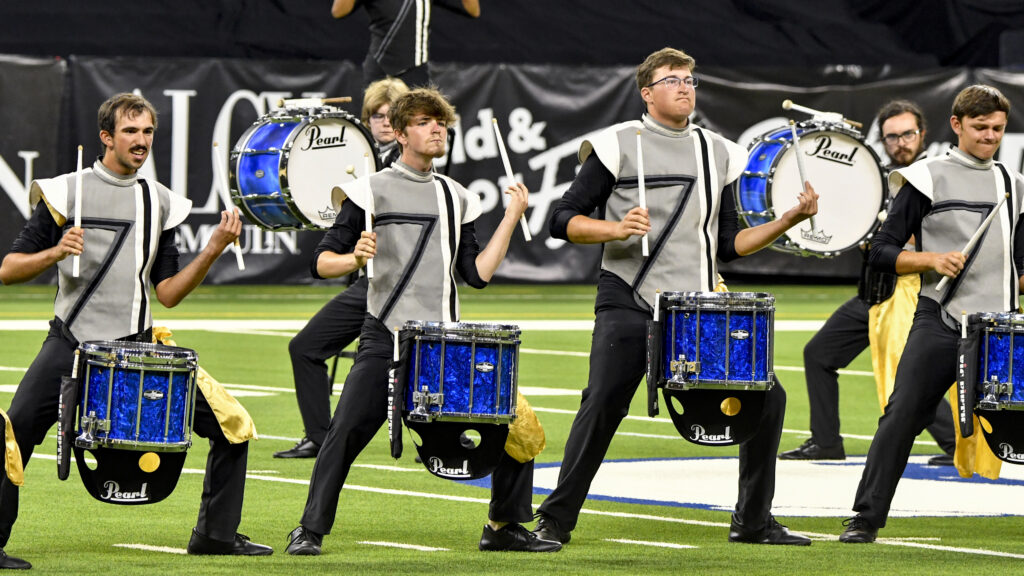Interlude is a new section of DCI.org dedicated to periodically telling the longer, more in-depth stories of the drum corps experience. If you have a longer drum corps essay that perhaps metaphorically relates to larger life, this is the place for it (writers seeking an online clip, here’s your chance). Send your completed essays, along with a brief bio and even a picture (and your own e-mail address, if you so choose), to [email protected] with the subject line “Interlude.” We look forward to hearing from you!
By Tony Connell As the sun greeted the crisp morning air, the aroma of bacon filled the grounds as the first day of corps camp had arrived. We had been cooped up in the “fire hall” all winter long, and now we were about to embark on three grueling days of marching and music. The year was 1976 and we in the Cambria Cadets were watching a replay of the Madison Scouts play “Rhapsody In Blue” as we dined on our breakfast. Our corps director and horn instructor, Rash Isenberg, asked one simple question: “How much are you willing to do to be like that?”
To this day I can still hear Rash asking that question. It just goes to show how much drum corps really touches the lives of those who participate. I never really answered that question until Garfield in 1983, but it shows how drum corps people are committed to excellence. That is a life lesson we all need to carry.
In a recent issue of The Altoona Mirror (from Altoona Pa.), There was an article about the sad shape of some of the area’s bands. It was all about a numbers game, showing the decrease in participation and blaming it on commitment. “A competition band takes up too much of the students’ time” was a quotation from a school official. “There are too many sports available for a student to commit to a competition band” is a paraphrased quote from another school official.
I don’t think these school officials realize how much they are teaching their kids to commit to mediocrity. These same schools, who promote the number of “opportunities” they have available, are also the schools with losing records in sports and are in the lower half of the learning curve when the state testing scores are published! These are also the same schools who make the best excuses in order to maintain their own dignity. Perhaps they need to learn something from drum corps and recommit to excellence.
My greatest hope for this article is that it helps you other drum corps bum band directors and band parents realize how important music is in helping maintain a healthy learning environment in your schools. Congratulations to the Blue Devils on an awesome show and a great victory this year, and I challenge all of the schools across the nation, “How much are you willing to do to be like that?”
ohn Anthony (Tony) Connell was born on Oct. 27, 1963. He is married and is a father. He began his musical career at the bright young age of 5 as a baritone player for the Cambria Cadets “pee wee” drum and bugle corps. He continued his marching career with the Cambria Cadets through 1980. In 1981,Tony’s marching moved eastward to New Jersey, where he marched with the Garfield Cadets through 1983. He was a three-year member of the Bishop Carroll High School marching band, which was under the direction of Jim McCurdy (who was the former Director of the USAF Academy drum and bugle corps).
He attended Indiana University of Pa., where he majored in music education, and was a four-year member of the marching band, “Tubaphonium” ensemble and various other concert bands and orchestras. Tony’s talents have landed him a host of directing opportunities. He has directed the Bishop Carroll High School marching band, the Cambria Heights marching band, the Cambria Cadets, the Baltimore Colts’ Band, and, most recently, the St. John Vianney’s Church choir. Tony Resides with his wife and daughter in the small town of Vintondale, Pa. He is the president of marketing for Breakwater International, a multifaceted musical promotional company and record label.

One of my major issues with band is that minimal attention is given to tuning and or tone quality both on the individual and ensemble performance level. Sure there are those programs like Marian Catholic HS (Ill.), Lassiter (Ga.), L.D. Bell (Texas), and Lawrence Central (Ind.), to name a few, that really display this maximum level of tone production and symphonic sound at the high school level. But the truth of the matter is, not enough groups are there yet.
I myself am guilty of rushing my own rehearsals to try to get the music done, but I am finding out, it’s not worth the struggle it causes in the end, when the kids realize they can’t play in tune, or listen throughout the ensemble. Coming back from tour, I was given the chance to listen to some high school groups, and my ears were ringing and my face almost turned over. It wasn’t until then that I realized how much drum corps improved my listening skills.
The hours spent on long tone and Remington exercises really improved aural skills; and other things that you just might not learn in your average ear training/sight-singing classes. I’m not even sure if I can adjust fully to the quality that some of the groups give, but wow! There is a distinct difference in the approach. While I listened to these various bands, I thought to myself, “What if they spent the extra 30 minutes working on fundamentals instead of playing a pep or show tune?” From then, I decided that I would add this to the list of things to do as a future music educator. While learning show music, and pep tunes is fun, if you can’t play in tune, or in “tone” as an individual or ensemble, you really haven’t met the full requirement.
Drum corps has made me more of a “perfectionist” than I already am; I’m so anal retentive to the point, I will start a piece over when the small details such as tone start to take their toll. I appreciate the hard work and effort that my brass caption head, Steve Menefee, went through with us this past summer, to make sure that our tone quality had improved. It wasn’t just benefiting me, it has also helped the other members.
I would hope that those who are aspiring music educators are bringing back what they learned and improved on this summer, and sharing that with their kids as well. This in return will help the corps, as well as raise the bar on our music programs in schools. The important thing is to spend time working on basics, don’t rush to play the music. It isn’t until you understand the basic fundamentals, until you are ready to play the good stuff … MUSIC!





